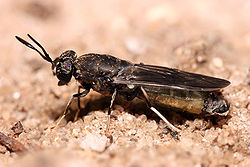How flies will recycle your food waste


A New Jersey start-up has devised a method for recycling food waste into oil and protein stocks by exploiting the voracious appetite of a unique fly that spends most of its life eating.
Green Waste Technologies is in the early stages of researching how black soldier fly larvae can be conscripted to decompose food waste into sustainable substitutions for petroleum, fishmeal, and pharmaceutical commodities.
The black soldier fly has no mouths parts, and lives only to breed. Its larvae eat to amass energy in preparation for a short-lived lifespan as an adult where it mates, lays eggs, and then dies.
Black soldier flies secretes a pheromone that keeps other species of fly away from their feeding grounds. Green Waste Technologies will provide technology to manage the breeding cycle.
Another start-up called OVRSol is focused on supplying the flies.
The fly's gluttonous lifestyle yields larvae that contain between 30-35 percent oil and fat and 43 percent protein, said Green Waste Technologies founder Olive Lynch. These properties make it well suited for recycling oil from food waste.
The conversion rate of larvae to oil is up to 95 percent of the weight that the bugs consume, Lynch noted. Each day, New York City disposes of 10,000lbs of food waste; the flies could conceivably produce up to 9,500lbs of oil from that volume.
Sustainable foodstocks
Energy is not the only application: the bug’s exoskeleton contains a substance called Chitin, which is widely used in agriculture and the pharmaceutical industry. Chitin sources are usually farmed from the sea.
The larvae may also be dried out and processed into protein meal – a sustainable alternative to fish farming to create feedstock for chickens and hogs, Lynch said. An added benefit is that it doesn’t put pressure on human food stocks, she noted.
The concept may seem novel in the United States, but Black soldier flies are already used to recycle palm kernels into aqua feeds in Indonesia - helping to address shortages.
Green Waste Technologies intends to start breeding flies by this fall to prove that the process can scale and become commercially variable.
Sustainable Business Incubator, a New Jersey firm that specializes in aiding green tech start-ups, and the New Jersey Department of Environmental Protection are serving as advisors.
The company’s business plan conceives that it will be possible to partner with local communities, ultimately creating incentives for waste haulers to participate via a guaranteed market for the fly’s higher value byproducts.
This is a low-tech process that does not require state-of-the-art facilities; communities can target empty factories, Lynch said. “It requires manual labor and will create entry-level jobs.”
Related on SmartPlanet:
Ecovative: The new plastic is made from mushrooms
This post was originally published on Smartplanet.com